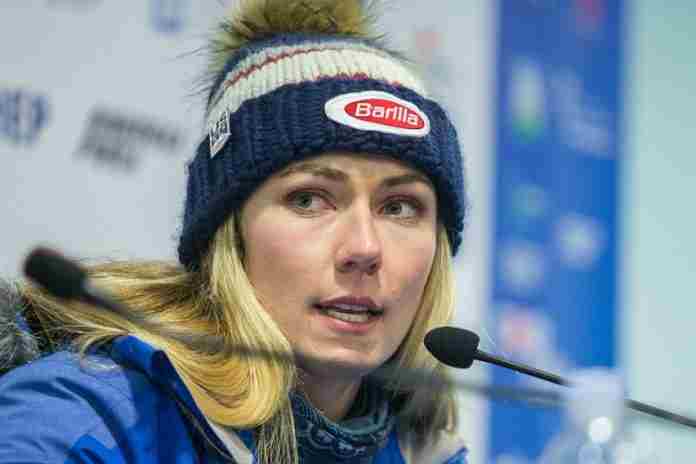(★ So grateful to our 44 donors, who have covered 76% of our site costs for services for the first six months of 2022. Like what you read? Please donate here. ★)
● Plus: Athletics: What if the NCAA Indoor was scored by states and countries? = Fencing: Allegations of abuse at Penn State = Swimming: Russian anti-doping agency suspends Rutgers swimmer; NCAA women’s champs this week = Triathlon: World Tri board member suspended for safeguarding violations ●
≡ SPOTLIGHT ≡
Mention American skiing star Mikaela Shiffrin, and many people will only remember her horrific Beijing Winter Games experience, where she failed to win a medal and didn’t finish in three of her six events.
But she may yet be the best women’s skier of the 2021-22 season.
She entered the four-event World Cup Final in Meribel (FRA) leading the seasonal standings – barely – by 1,245 to 1,189 over Slovakian rival Petra Vlhova, the reigning World Cup winner.
Both are best in the Slalom and Giant Slalom, but Shiffrin has shown considerable range in the speed events as well. On Wednesday, she did it again.
Starting 21st out of 27, Shiffrin had not won a Downhill medal this season, but had two wins in the event, from 2017 and 2020. She started well, but gained a lot of speed on the bottom part of the course and came in at 1:27:00, a stunning victory over surprise co-leaders Christine Scheyer (AUT) and Swiss Joana Haehlen, who tied at 1:27.10.
For Scheyer, it was her first World Cup medal since 2017 (!) and only her second ever. Haehlen won only her third career World Cup medal and first in two years.
Vlhova finished 16th, meaning she scored no points in the event, while Shiffrin took 100 for the win and now has a 1,345-1,189 lead over Vlhova with the Super-G, Slalom and Giant Slalom remaining. Shiffrin is better at the Super-G than Vlhova, with three medals this season (0-1-2) to none and both are terrific in the technical events.
Imagine a rebound from Olympic disaster to World Cup champion; if Shiffrin is able to do it, it would be her fourth World Cup overall title and the first since her father died unexpectedly in February 2020. Said the winner:
“I feel like I’m supposed to not be winning downhills, so it worked out amazing today.”
The race completed the World Cup Downhill season, with Italy’s Sofia Goggia winning the seasonal title with 504 points to 407 for Swiss Corinne Suter. Czech Ester Ledecka was third (339).
¶
In the men’s Downhill in Courchevel, Austria’s Vincent Kriechmayr won his second World Cup race of the year, ahead of Swiss star Marco Odermatt, 1:50.43-1:50.77, with fellow Swiss Beat Feuz third (1:50.97). American Ryan Cochran-Siegle was eighth (1:52.06).
The win sewed up the seasonal World Cup title for Odermatt, his first, to go along with his Olympic Giant Slalom gold. He’s already the seasonal Giant Slalom champion as well.
Norway’s Aleksander Aamodt Kilde was fourth and won the seasonal Downhill title with 620 points, to 607 for Feuz. The racing continues through Sunday.
≡ THE 5-RING CIRCUS ≡
● Alpine Skiing ● Further to Shiffrin and the whole U.S. Ski Team, a fascinating discussion is taking place within the U.S. skiing community in the aftermath of the one-medal performance in Beijing, the worst U.S. showing since 1988.
It started with a post from SkiRacing.com Editor-in-Chief Geoff Mintz titled “Yes, we need to talk about medals” on 24 February. Highlights:
● “Anyone who says the Olympics are not important to Alpine ski racing has never sat through a U.S. Ski & Snowboard Partner Summit in Park City, where in the air-conditioned dog days of summer the Olympic drumbeat resonates throughout the $22 million Center of Excellence, years in advance.”
● “Should we determine the strength of a national program based solely on Olympic results? Definitely not, but they do help sound the alarm when things aren’t quite right.
“The time and money — blood, sweat and tears — that go into running the national organization as well as countless club and academy programs across the country on a year-round basis is staggering. U.S. Ski & Snowboard’s budget for programs and admin in 2020 was nearly $45 million. It’s even more staggering when you begin to consider the time and money — blood, sweat and tears — needed to support independent development programs, academies, camps, equipment, travel, and so on and so forth.”
● “[W]e, as a nation, came up short in these Games. This isn’t ‘athlete bashing.’ The athletes are least to blame. And it wasn’t the media’s fault either, as some would suggest. The pressure came from within and would cripple any one of us. The team needs to be deeper. The team needs to be stronger. We need less pressure (and less hype) on a select few.”
A few days later, U.S. star Breezy Johnson, who was a medal contender in the speed events but could not compete in Beijing due to injury, replied, including:
● “[L]ook at where we are at now. This season alone we spread podiums again across 4 athletes, but [Ryan Cochran-Siegle] was fourth once and got a medal at the Games too so I say 5 podiums. We had an athlete place top ten in every discipline. You look back over the last 2 years? We have had 7 different athletes on the podium at least once. We didn’t even have that many different people podium in 2009 and 2010, we only had 6, including Andrew [Weibrecht]’s Olympic podium. You want to talk about depth? We finally have depth!”
● “The reality is this team was a knife’s edge away from 8 realistic medals, Mikaela could have gotten four, I could have gotten one, River [Radamus] could have gotten one, the Team [Event] could have gotten one, [Cochran-Siegle] did get one. That’s the same haul as Vancouver, our best games. But welcome to ski racing. We all took Mikaela for granted all this time and the reality is that almost every American great in the last 25 years had a down Olympics, Lindsey [Vonn], 2006, Ted [Ligety], 2010, and Bode [Miller] 2006. It happens. All of those athletes became fiercer and better, if not because of it, then after it.”
● “So give it a rest. You want to complain? Write a damn check because what we are doing is working even if you can’t see it yet. And the great people on the U.S. Ski Team have a lot of brilliant uses for your money.”
But changes have come, as the U.S. Alpine Director Jesse Hunt, in place since 2018, is stepping down and will be replaced.
And in a 7 March post from Aldo Radamus, whose son River is one of the bright young stars of the U.S. team:
“A deeper look reveals that this Olympics wasn’t the disaster that some make it out to be and that there were unexpected positives and continuing signs of progress.
“But make no mistake: A team with numerous superstars is needed to win the Olympic medal tally. While some are on track rising through the pipeline, the U.S. has only one. …
“Usually, when elite performance is at a high level, there is less attention given to what is provided for the rising juniors. When there is a need for rebuilding, the best developing athletes are brought together in centralized camps and named teams. Without fail, efforts that start as part-time programs evolve to become full-time teams as the athletes and coaches involved realize the need for consistency and focus. …
“Let’s all take a deep breath. In sport, as in life, the best planning doesn’t always result in the expected outcome. Let’s not waste time laying blame but work together to help our athletes and teams achieve what should be all our goal: For the United States Alpine Ski Team to be the best team in the world of Alpine ski racing.”
The discussion continues. It’s a good one to have, but nothing will be settled for four years.
● Athletics ● Andrew Sweeney, the assistant coach for distances at Lamar University, broke down the scoring at the NCAA Indoor Track & Field Championships by home state or country rather than by school:
The men’s leaders included Texas (70.5), Florida (36.5), Jamaica (32.5), Arizona (30.25), Pennsylvania (27.00), California (25.25) and Nigeria (22.5).
The women’s leaders were Texas (57.5), Ohio (47.5), California (40.0), New York (34.75),
Pennsylvania (32.0), Michigan (29.25) and Illinois (26.75).
Pretty interesting. Can’t wait for outdoors!
● Fencing ● Another step on the long path of changes in the way coaching is done may be underway at Penn State, according to the influential FencingParents.com site.
A late January post was headlined “Is There a Monster at Penn State University Fencing?” and went on to detail the difficult experience of former Nittany Lion fencer Zara Moss. Excerpts:
● “Zara Moss and her mother Julie, shared with me the overwhelming trauma that Zara’s fencing coach at PSU had inflicted on her during her four years on the NCAA fencing team there. Zara’s fear of retaliation, and especially her fear of losing her full ride scholarship, stopped Zara from speaking out against this abusive coach sooner. She finally did so in March 2020, her final semester at PSU, but as you know from Zara’s [posted] video, she received no response whatsoever from the PSU compliance department.”
● “Throughout her four years at PSU, Zara was subjected to a systematic pattern of deliberately misogynistic and offensive language that was highly abusive and deeply traumatizing …
“Here are just a few examples:
- He denied her access to her trusted high school coaches and told her she needed to spend less time with her family.
- He threatened her scholarship on a regular basis.
- He told her what she needed was a boyfriend.
“He told her lies about what other people were saying about her and berated her in front of her teammates. One day, he called her into his office and told her she should be embarrassed because she was a disappointment to him . . . to the fencing team . . . to the entire university . . . to her friends and . . . to her family.”
The site called for Penn State coach Wes Glon, with the program as an assistant since 1985 and head coach beginning in 2013, “must be thoroughly investigated by PSU, SafeSport and FenceSafe, and removed from his position of power and authority over fencers of any age, if he is found guilty as charged. Pending the outcome of these investigations, Wes Glon needs to be suspended as a coach and from membership of US Fencing.”
This would not be new for Glon, who was cleared in a U.S. Center for SafeSport arbitration hearing in November 2021 after being suspended for three years by SafeSport for “failure to report sexual misconduct allegations against assistant coach George Abashidze, abuse of process and retaliation.”
The FencingParents.com report noted “PSU is now paying attention to Zara’s complaints,” but called for continuing pressure on school officials.
● Swimming ● Russia may be at war in Ukraine, but the Russian Anti-Doping Agency has not taken any time off.
SwimSwam.com reported that Russian swimmer Elizaveta Ryndych has been suspended for two years by RUSADA, in violation of a Therapeutic Use Exemption (TUE), with the suspension period beginning on 11 June 2021.
No further details were provided; Ryndych could have been taking a medication with prohibited ingredients and failed to get a TUE.
The site noted she is one of three Russian swimmers on the Rutgers team, where she recently completed her freshman season. The suspension would impact the swimmer’s international eligibility, but not for domestic competitions or for NCAA events (the NCAA is not a signatory to the World Anti-Doping Code).
¶
The NCAA Women’s Swimming & Diving Championships begin today in Atlanta, with a lot of attention to be focused on Penn transgender senior Lia Thomas.
Formerly a Penn male swimmer for three years, she transitioned to female, including taking hormone therapy to reduce her testosterone level to under 10 nmol/l, the NCAA’s standard. She has qualified for the 500-yard Freestyle (ranked no. 1 in the nation at 4:34.06), 200-yard Free (1:41.93: no. 1) and 100-yard Free (47.63: no. 10).
Look for plenty of coverage and commentary, starting here.
● Triathlon ● World Triathlon posted a statement of major penalties against four senior figures in the Korean Triathlon Federation:
“World Triathlon Executive Board member and Asia Triathlon President, Justin Sukwon Park, has been suspended for two years by the World Triathlon Tribunal for alleged violations of the World Triathlon Safeguarding Policy and the World Triathlon Code of Ethics. Mr Jae-Keun Lee, Korea Triathlon Federation Secretary General, Mr Woo-Kyong Ki, Business Operations Manager of the KTF, and Mr Yonghu Jeon, Deputy Secretary General of the KTF, have also been suspended for 18 months for violations of the World Triathlon Code of Ethics.
“The Tribunal ruled that Mr Park committed violations of both Codes over the handling of allegations made by South Korean triathlete Choi Suk-Hyeon, who committed suicide on 26 June 2020, after years of alleged physical and verbal abuse by her coach and teammates.”
It’s not good to have a member of an International Federation Executive Board suspended, but Park has been suspended from his role as of 8 February 2022. In specific:
“According to the Tribunal, considering the seriousness of the alleged harassment and abuse of Ms Choi, the KTF’s failure to inform World Triathlon of the matter until after Ms Choi’s death, and its failure to inform Lead Welfare Officers of World Triathlon of the allegations at all, and given Mr Park’s close relationship and contacts with World Triathlon, and his failure to ensure that the KTF complied with its reporting obligation, either through its officers or personally.”
There is no allegation that Park had anything to do with the actual abuse of Choi, but that he had a duty to report it and kept quiet. Maybe this will educate others on their responsibilities.
You can receive our exclusive TSX Report by e-mail by clicking here. You can also refer a friend by clicking here, and can donate here to keep this site going.
For our 832-event International Sports Calendar for 2022 and beyond, by date and by sport, click here!




















